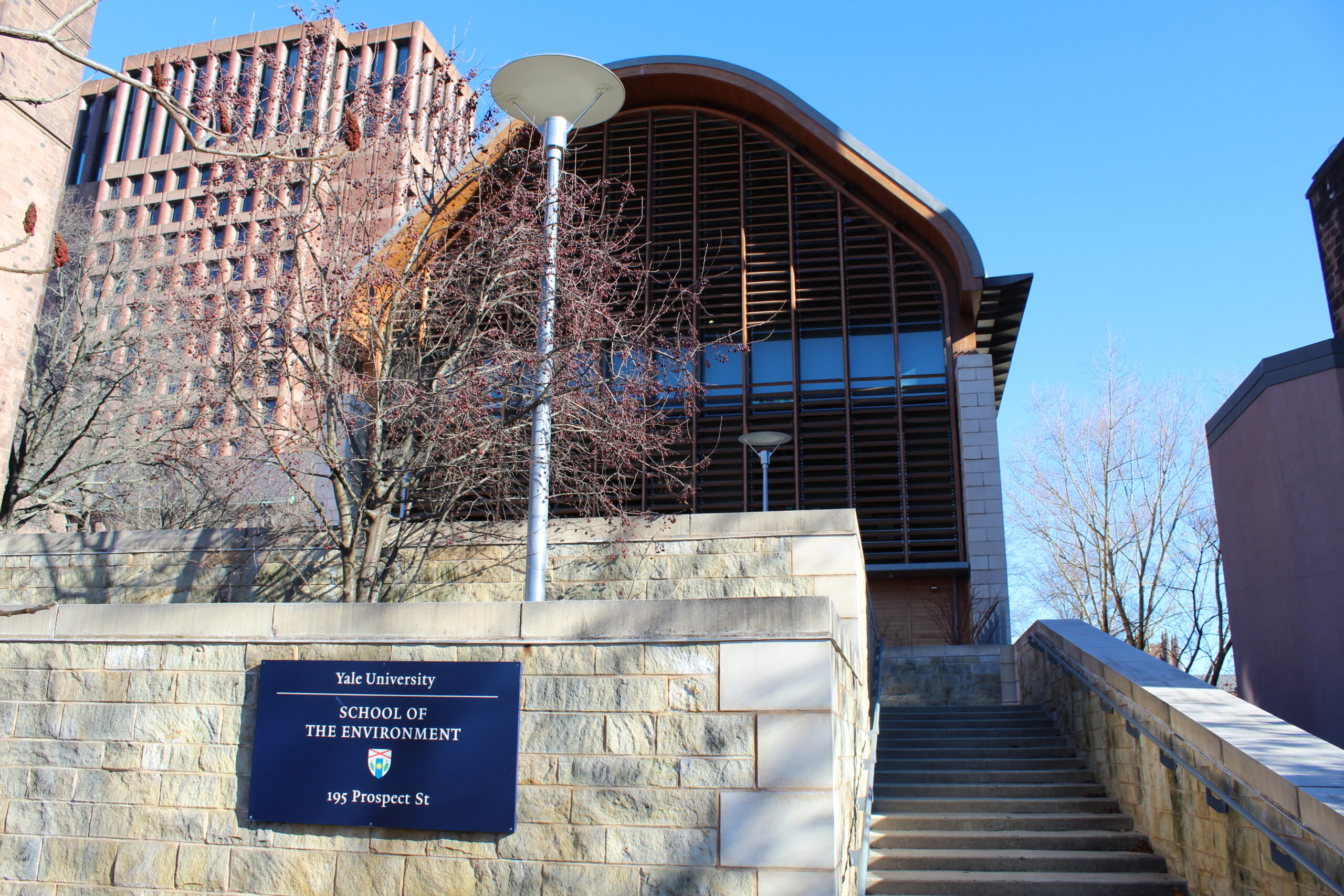Ali Zaidi, former White House climate advisor, gives talk at School of the Environment
At a talk last Friday, moderated by professor Daniel Esty LAW ’86 at the School of the Environment, Ali Zaidi, former climate advisor at the White House, discussed the role of institutions in addressing climate change.

Paul-Alexander Lejas
At a packed lecture in Kroon Hall on Feb. 14, former White House climate advisor Ali Zaidi discussed the future of climate policy, emphasizing the central role of institutions in navigating the nation’s environmental and economic crossroads.
Zaidi’s talk, titled “Rethinking Climate Change and Progress,” was moderated by environmental law professor Daniel Esty LAW ’86. His address, which spanned insights from his time in both the Obama and Biden administrations, highlighted the necessity of institutional evolution in addressing climate change amid regulatory fatigue and economic uncertainty.
“Joe Biden didn’t invent the idea that climate creates jobs, but he capitalized on it,” Zaidi said.
Zaidi noted that, under the Obama administration, climate efforts were often constrained by a narrow focus, with just one or two economists working on climate, with policies targeting individual sectors one at a time.
In contrast, the Biden administration’s broader team has been able to address multiple sectors simultaneously, fostering innovation in the clean energy revolution while boosting American competitiveness.
During the discussion, a student question on the role of institutions in the next few years shifted the focus of the discussion from federal strategies to the broader implications of institutional trust in the post-COVID-19 era.
Zaidi said that rebuilding public confidence in government is “as essential as modernizing our grid,” acknowledging that the economic and psychological impacts of the pandemic had left many Americans skeptical of sweeping regulatory mandates.
Esty expanded on this sentiment, offering an academic hypothesis.
“Democrats have become the party of regulation, but coming out of COVID, people were tired of being told what to do by the government,” Esty said. “Donald Trump gets some things right in diagnosis — trade requires a fundamental reciprocity.”
Zaidi acknowledged the complexities of pursuing such an agenda in today’s fragmented political landscape, noting that they haven’t quite figured out a social license for decarbonization pathways, one that won’t add pressure to American consumers, emphasizing the need for policymakers to balance environmental objectives with economic realities.
Zaidi’s discussion also highlighted Yale’s role in climate policy innovation. He pointed out that Yale alumni, such as Aaron Troncoso ’17 LAW ’23 ENV ’23, who worked on clean energy tax implementation, and Katie Schlick ’22, who served as his special assistant, contributed significantly to the White House’s climate efforts.
Zaidi also reflected on his collaboration with Yale professor Ken Gillingham during the Obama administration.
According to Zaidi, Yale has been a venue for pioneering climate ideas, citing his own experience at the University in 2021, when it served as the location for him to outline new paths forward on industrial sector decarbonization and reforming the U.S. trade system to address climate challenges.
This conversation underscored the intertwined nature of climate policy and democratic institutions.
“We need to vigorously protect and defend the institution of democracy,” Zaidi said. “Whether it’s the Clean Air Act or the broader empowerment of our legal system, these frameworks are critical to our society.”
Following the talk, Esty reflected on the broader implications for institutions like Yale in addressing climate change.
Esty suggested that Yale’s role over the next four years will be crucial in advancing the underlying science of climate change, particularly regarding the emerging impacts and strategies for slowing that harm.
He also emphasized the importance of Yale’s ability to bring together global efforts in a coordinated response to this crisis.
Esty also pointed out that Yale is uniquely positioned to contribute to the governance of climate change, especially through the work of its interdisciplinary programs and centers.
The event itself was sponsored by the Yale Center for Environmental Law and Policy, alongside four of the nine specialized learning communities at the School of the Environment: the Environmental Policy Group, Climate Change, Energy Group and Business and the Environment.
Niva Cohen ’27 shared after attending Zaidi’s talk, “Well, first my thoughts about his talk were that he had a lot of what I thought was a warranted optimism, but I also think it’s necessary optimism being in an institutional role. I think he has to reflect that, but being an academic institution, it has to have a little bit more weight behind optimism.”
Zaidi was the White House’s second national climate advisor.







